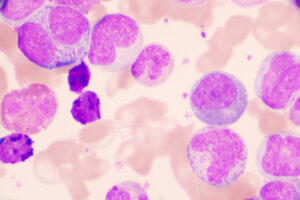Oncology
Chronic Lymphocytic Leukemia
Taking a Whole-Patient Approach to Treating Chronic Lymphocytic Leukemia
Overview
Comprehensive care in chronic lymphocytic leukemia (CLL) ranges from understanding the patient’s treatment preferences to counseling them on recommended vaccines and screenings. Several presentations at the 63rd ASH Annual Meeting and Exposition highlighted aspects of whole-patient care in CLL.
Following the conference, featured expert Matthew S. Davids, MD, MMSc, was interviewed by Conference Reporter Editor-in-Chief Tom Iarocci, MD. Dr Davids shares his perspectives on the relevant proceedings here.
Matthew S. Davids, MD, MMSc
|
|
“Patient preferences regarding CLL treatment are an important aspect of whole-patient care, and these preferences can be highly individual.”
We are at an interesting time point in the field right now in that there are several very effective treatments that incorporate novel targeted therapies, and these options are all quite different from the patient’s perspective. We have venetoclax plus obinutuzumab, which has a fixed-duration schedule that requires a ramp-up period for venetoclax initiation, while Bruton tyrosine kinase (BTK) inhibitor therapy is a continuous oral therapy. Toxicities also differ among therapies. For example, venetoclax-based treatment requires close monitoring for tumor lysis syndrome, and BTK inhibitors carry the risks of cardiovascular complications and bleeding. Except for in cases of high-risk genetics, in which most patients should start with a BTK inhibitor, we do not currently have a wealth of comparative outcomes data that would enable us to view one approach as being preferred over another, which underscores the importance of individual patient factors and preferences when making treatment decisions.
Patient preferences regarding CLL treatment are an important aspect of whole-patient care, and these preferences can be highly individual. Many younger patients might prefer the simplicity of starting with a pill because they may still be working hours that would make it difficult for them to come in for the venetoclax ramp-up. Conversely, other young patients may not like the idea of being on a pill indefinitely, especially if they are not already on a chronic medication. The results of a web-based survey on treatment options were presented at ASH 2021, with researchers reporting gaps in the knowledge base among patients (although there seemed to be patient awareness of the options) and a theoretical preference for finite-duration therapy among internet-active caregivers and patients (abstract 1927). This underscores the importance of explaining the different nuances of the available treatments to patients.
Caring for the whole patient also includes encouraging individuals to stay up to date on their preventive health measures, cancer screenings, and vaccinations. For example, we always recommend regular dermatologic surveillance for skin cancers and being up to date on other screenings such as colonoscopies and mammograms. Increased infection risk is also something that we think about in CLL, and ASH 2021 featured several new reports related to COVID-19 vaccine efficacy.
A study in patients with CLL from the French Innovative Leukemia Organization found that 2 doses of an mRNA vaccine produced a humoral response in 52% of patients, and a third dose induced seroconversion in 42% of individuals who had been seronegative after a second dose (abstract 637). Further, a prospective study from Israel evaluated T-cell responses following the BNT162b2 mRNA COVID-19 vaccine in patients with CLL (abstract 638). Notably, while T-cell response was generally blunted in patients with CLL compared with healthy controls, 24% of patients with CLL who had no measurable anti-spike immunoglobulin G antibody response did have a T-cell response to vaccination. This provides some initial evidence that, at least for some patients, the vaccine could be effective without a detectable serological response. Still, it is unknown how these vaccines and boosters will perform in the face of newly emerging variants, and I continue to encourage patients to be very careful and to act as if they are unvaccinated, for now.
Finally, advanced age may be relevant in whole-patient care, and one of the challenges has been that patients who are commonly seen in clinical practice tend to be older and less fit than those who are typically included in clinical trial populations (abstract 1552). However, in the past, the average age of patients in the chemotherapy studies was often approximately 60 years, whereas the median age in more recent trials is often closer to 70 years. So, as a field, I think that we are probably improving in including patients in our trials who are more representative of patients with CLL in the real-world setting. Nonetheless, we often see patients aged 80 years and older in clinical practice, and they are still underrepresented in trials. I think that dedicated studies in this age group would be valuable.
References
Bagacean C, Letestu R, Al Nawakil C, et al. Humoral response to mRNA vaccines BNT162b2 and mRNA-1273 COVID-19 in chronic lymphocytic leukemia patients [abstract 637]. Abstract presented at: 63rd American Society of Hematology Annual Meeting and Exposition; December 11-14, 2021.
Itchaki G, Rokach L, Benjamini O, et al. Cellular immune responses to BNT162b2 mRNA COVID-19 vaccine in patients with chronic lymphocytic leukemia [abstract 638]. Abstract presented at: 63rd American Society of Hematology Annual Meeting and Exposition; December 11-14, 2021.
Koffman B, Stewart C, Avruch L, et al. Awareness, knowledge, and preferences of United States (US) patients with chronic lymphocytic leukemia (CLL) and their caregivers related to finite duration (FD) therapy and minimal (measurable) residual disease (MRD) [abstract 1927]. Abstract presented at: 63rd American Society of Hematology Annual Meeting and Exposition; December 11-14, 2021.
Le H, Ryan K, Wahlstrom SK, et al. Patient and physician decision-making on the use of novel agents in chronic lymphocytic leukemia (CLL): what drives preferences? J Clin Oncol. 2020;38(suppl 29):148. doi:10.1200/JCO.2020.3829 suppl.148
Simon F, Giza A, Robrecht S, et al. Pooled analysis of first-line treatment with targeted agents in patients with chronic lymphocytic leukemia (CLL) aged 80 years and older [abstract 1552]. Abstract presented at: 63rd American Society of Hematology Annual Meeting and Exposition; December 11-14, 2021.
This information is brought to you by Engage Health Media and is not sponsored, endorsed, or accredited by the American Society of Hematology.











